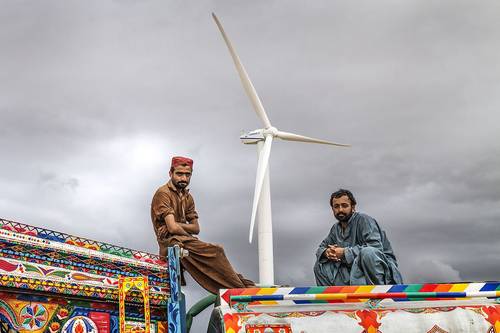The World Wind Energy Association and Global100RE welcome the presence of more than 400 international and domestic participants who attended this Conference from across the spectrum of renewable energy technologies.
We acknowledge and applaud with gratitude the opening address of the President of Pakistan, the Hon. Dr. Arif Alvi, in which he expressed his commitment to sustainability and renewable energy playing a key role in Pakistan’s energy future.
We welcome the commitment of the Government of Pakistan to achieve 30% renewable energy in its energy mix by 2030, in addition to 30% from hydropower which will bring the total renewable power to over 60% by 2030. This will constitute a major step towards a world ultimately using 100% renewable energy.
We underline the very clear statements made by representatives from Government as well as from private sector that renewable energy today represents the lowest-cost solutions, even without taking into account external cost such as caused by climate change or air pollution.
We, the participants and stakeholders from public and private sector, have endorsed the 2019 renewable energy policy as appropriate, achievable and absolutely necessary.
The conference has identified the key drivers for renewable energy in Pakistan:
- development of indigenous renewable energy sources instead of expensive fossil fuel imports,
- improving the macroeconomic crisis by reducing the circular debt and improving the investment climate,
- creating climate change mitigation and resilience for Pakistan, given that it is one of the hardest hit countries by climate change, and
- meeting Pakistan’s international commitments to the Sustainable Development Goals.
The Conference covered all aspects of renewable energy development (including, solar, wind, hydro, geothermal, biomass/biogas, tidal, etc), science and technology, related policies, manufacturing, capital markets development to enable financing, operation, hybrid/integrated solutions, socio-economic development, community involvement, and job creation.
The Conference appreciates the support of the Government of Pakistan, Alternative Energy Development Board, Pakistan-German Renewable Energy Forum, Board of Investment, Sindh Transmission and Dispatch Company as well as all non-governmental organisations, and all sponsors.
The Conference has identified the barriers to development and next steps to facilitate further development of renewable energy in Pakistan to achieve sustainability:
- A comprehensive Pakistan Renewable Energy Program under the Patronage of the President, and through private sector, with an integrated approach across multiple sectors is needed, which is driven by a consistent and stable renewable energy policy. It will be necessary for government to create a long term market signal by establishing renewable energy targets with associated dates, preferably annual targets to reach the 30% goal.
- It will be necessary to further develop the grid system and to extend it to provide reliable, dispatchable, and sufficient transmission and evacuation capacities. Hydropower integration into the renewable energy policy can optimize synergies for Pakistan’s transition to a renewable energy mix.
- Open, transparent, and non-discriminatory power purchase and payment for renewable energy needs to be provided, including market structures that allow for market evolution and entrance of new players to develop a renewable energy market of size. Capital markets must be developed in tandem with renewable energy to create viable competitive power markets, boost investor confidence and allow for affordable financing of renewable energy. It is also necessary to create a policy conducive to project finance as practiced globally. Sovereign guarantees are required until a sufficient enabling country environment is created that investors are comfortable with.
- Given infrastructure development and country risks differ by country, risk premiums for renewable energy projects need to be priced as per Pakistan country risk and individual project risk.
- Access to electricity and modern energy services needs to be available to all Pakistani citizens through extension of the grid, in addition to rural electrification and development of off-grid/distributed generation.
- Local manufacturing and assembly for renewable energy technologies should be supported. Effective incentives for more local content should be made part of the new renewable energy policy.
- As a component of a global initiative for renewable energy capacity building addressing human resource development and varying from field technicians to management executives, an international renewable energy training center (IRET) should be created. The global initiative should address the energy, climate and development targets alike and develop a corresponding knowledge base which can also support the development of innovative energy models on local, regional and national level.
- Distributed generation should be used to empower local communities and make socioeconomic benefits and participatory opportunities available to them.
The participants of the conference welcome the cross-sectoral representation at the event and underline the opportunity to exchange views between government, private sector, academia and civil society and express their willingness to continue and intensify this dialogue and cooperation in the years to come.


